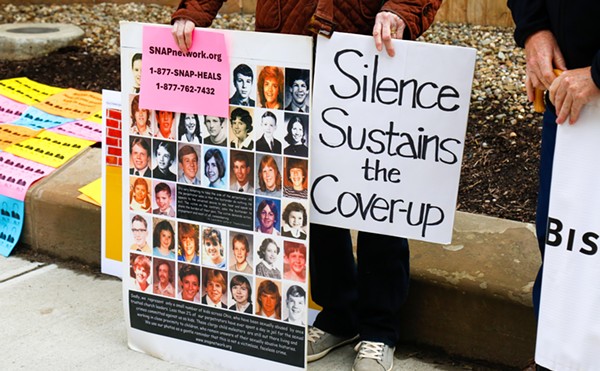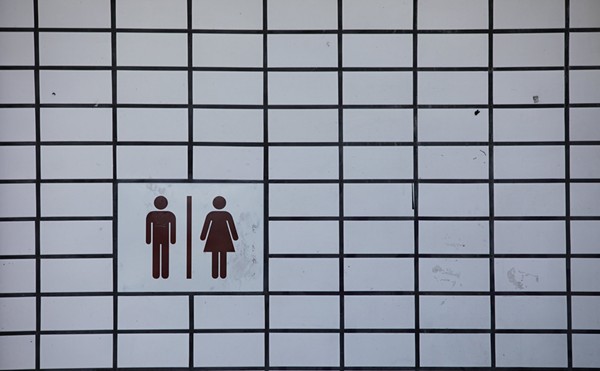"Let's pump this muthafuckin' beat!" screams Poetry, a hulking figure who prances around in socks and a shirt that reads, "You don't have to be Chinese to enjoy my wang."
The rent-a-DJ feeds more juice into the mixer, spitting out something akin to African-tribal-rhythms-meets-industrial-techno. Then he stands back and waits for it to happen. He's done this gig before, and it's no bar mitzvah.
A circle forms around the carpeted room. Two guys move to the center, one wearing red throwback hightops, the other's ears bejeweled in diamond-encrusted marijuana leaves. They swish around each other as fluidly as streamers, spinning like tops, bouncing on the ground like Russian dancers, falling backward, arms spread, to the floor. The crowd pulsates as one organism, a wave of arms extending to the ceiling, then caving in like a flower blooming and wilting at hyper-speed, while Poetry furiously chants a foreign language into a microphone. They've only got four hours.
These are the kids of the Beyond Identities Community Center -- BICC for short -- a program run by the AIDS Taskforce. It's as much a safe house as it is a gay youth center. The location is secret. There's not so much as a rainbow flag in the window.
Outside those heavy glass doors that open only when someone buzzes you in, South Beach it isn't. There are no gay bars in Fairfax. There's no LGBT club at East High School, no P-Flag (Parents and Friends of Lesbians and Gays) in Slavic Village. There are no preachers on Buckeye Road who will spare you from hell for loving another man. And in a community that buries young men nearly as often as graying retirees, parents pray harder when their son is swishing down Harvard Avenue.
Some kids at BICC have been kicked out of their homes for being gay. Those who still go to church walk like scarecrows for God. And the nightclub scene is a mine field of violence, drugs, and prostitution. Two boys from BICC have been murdered in the past year.
"Right now, we live with targets on our backs," says 19-year-old Jordan. "People don't let you live no more."
Tony Bryant doesn't want you to believe the sappy stories about how BICC gives gay kids a place to express themselves. It's BICC's fault his son is dead.
Bryant came home after serving eight years in prison for burglary to find his 14-year-old son Donathyn growing up a fag. The boy was living with his grandmother, who had enrolled him in tap-dancing classes, for chrissakes.
Donathyn had clearly suffered from not having a father in the picture. His grades at Heights High were pitiful. But Bryant was determined to make up for lost time. Donathyn moved in, and Dad instituted a boot-camp policy on homework. Soon, his son was at the top of his class. But something was still very wrong.
Donathyn's grandmothers had coddled him for so long that they'd practically turned him into a girl, says Bryant. So he made Donathyn go out for the football and track teams, neither of which interested his son in the least. But, says Bryant, "He was going in the right direction."
Just to make sure, Bryant also attached a bug to the phone, using a cheap Radio Shack device. That's how Dad discovered that Donathyn was sneaking out at night, fooling around with boys, hanging out at BICC. He'd later find a wig and girls' clothing in the kid's room.
"For entertainment they'd all get together, dress up as girls, and dance around the center," says Bryant, disgusted. The center, he says, "empowered" his son -- the last thing Donathyn needed.
Bryant tried talking to Donathyn. Okay, you're gay, he told him, but "Why do everybody gotta know?" There was a difference between being gay, Dad told his son, and "being a fag." When that didn't reach Donathyn, Bryant tried tough love.
One July 4, Bryant came home to find another boy at the house with Donathyn. They were just hanging out. Still, Bryant felt his son was being promiscuous. He told Donathyn to sit down at the kitchen table and write an essay to his father explaining his behavior. The kid refused. Dad smacked him.
Donathyn went back to live with his grandma. With her, he was free. He started wearing women's clothes, even to school. His girl name was Jayala.
Bryant was helpless to stop him, though he tried. When he found a pair of women's shoes, he returned them to the store. He convinced his son to dress like a boy for a job interview at a restaurant in Beachwood.
Bryant feared for his son's safety -- and with good reason. In September of last year, Donathyn was picked up by Cleveland cops for trading sex for money outside Bounce, a gay club on Detroit Avenue.
"I used to say, 'Man, I wish somebody'd beat him up to make him stop," says Bryant. "You know, scare him."
Two months after his arrest, Donathyn was back, strolling Detroit. On November 14, after the bars closed, he was walking down the street when two black males started chasing him. Donathyn ran to an abandoned gas station at West 45th Street. Then the shots started. One tore through his left thigh. Another ripped through his back. The bullets kept coming -- to his shoulder, his head.
Donathyn died in a mirror-pond of red. Police still have no suspects, no motive.
Bryant has had a year to reflect on his son's death. To this day, he blames Donathyn's grandmother for not disciplining him and the BICC center for "recruiting" prostitutes -- and also himself, for not trying hard enough.
"I almost bought him a prostitute," he says of his attempts to make Donathyn straight. "I'm kicking myself every day."
"All right, y'all, listen up!" shouts BICC staffer Natoya Cody, mean-mugging a group of kids talking in the corner. Cody is built like a brick shithouse; it gets quiet real quick.
"We gonna have a condom demonstration, then y'all gonna practice puttin' a condom on a dildo. The quicker y'all do it, the quicker y'all can get back to the music." Her voice is like a loudspeaker. "Let's get it!" The giggling crowd crams around a folding table where two upright dildos are waiting.
BICC was launched in 2004 with a grant from the Centers for Disease Control, the feds hoping to reach urban gay kids, a group plagued by HIV and drug use. The AIDS Taskforce rented a creaky warehouse on the East Side -- a site used to film low-budget horror movies -- and spread the word.
On opening night, more than 80 kids showed up. Within a year, they needed a new space. BICC now numbers more than 900 members.
"There's this huge mass of kids out there that no one seems to know about or identify as a sort of discrete community who are showing up here," says Earl Pike, director of the task force. "They're sort of invisible within the larger society."
Kids drop by after school for discussions on everything from prostitution to safe sex to how to come out to your parents. Some come because they have nowhere else to go. Many are too young to get into the clubs, and most of the older ones don't even bother.
There's no scene here for black gay men, says 18-year-old Markel Elahnik. Bounce, he says, has "too many white people." Club 727 has "too many dykes."
Serving the urban gay club-hopping scene has become a risky proposition. The once wildly successful Club Out on St. Clair closed after its younger clientele brought fighting, drugs, and drama. Belinda's Night Club on Madison Avenue tried to host a gay night for mostly Latino and black crowds, but never got the draw. Mahogany, a drag queen, says that "the gays felt uncomfortable" partying at an otherwise straight bar.
Last year, even Bounce, in a move seen by many blacks as discriminatory, instituted a strict dress code, barring "urban" wear like ball caps, jerseys, and oversized T-shirts. So kids who want to hear hip-hop and hang out with boys are left to drive to the Interbelt Nite Club in Akron.
"The city of Cleveland has a lot of trouble maintaining bars for LGBT people of color," says Tony Glassman, a writer for the Gay People's Chronicle. He sees black men at the Grid on St. Clair, but "They're not really what would be described as the urban type. They're the Abercrombie & Fitch, the Hollister, the non-typical suburbany African Americans. They're twinks that just happen to be dark-skinned."
Asked what they did before BICC, some kids say that they'd call up the local gay chat line or party in someone's cramped basement. But many of them just answer, "Nothing." Their lives were too complicated -- parents missing in action, little brothers running with gangs and slinging drugs -- to have a coming-out party.
Of the ones who do come out, their parents often seem to feel the same way. Raising a son here means keeping him out of the newspaper photos of boys too young to grow a mustache, looking up at a judge. Out of news briefs that list name, age, and the body parts the bullets entered. It also means getting him square with the Lord. Having a son who is gay doesn't make those things any easier.
P-Flag volunteer Bruce Kriete says he notices a disturbing lack of black parents at the group's monthly meetings at Trinity Cathedral. "We've had [black] parents over the years, but they obviously don't feel comfortable," he says. "They're the only ones in the group, and I think they're always going to feel like they're outsiders."
At the moment, there's only one black gay woman who comes regularly, says Kriete. But her mom refuses to come along. "Her mother says that's a white person's disease," says Kriete. How do you combat that?
The Cleveland schools have all but turned a blind eye to the problem. Mika Major, who runs the youth program for the LGBT Community Center on Detroit Avenue, has tried to help students set up school-sanctioned gay clubs. But of 18 high schools in the district, only one -- Rhodes -- has ever had such a group. And it was discontinued last year after the faculty advisor left the district. Meanwhile, suburban districts like Rocky River and Nordonia-Macedonia have thriving clubs.
Kids who try to penetrate school bureaucracy often "get the runaround," says Major. Administrators in some inner-ring suburbs have also stonewalled them. One high school principal told a girl who wanted to set up a club that it would have to meet for a full year before it could be made official. Meanwhile, a chess club was given official status immediately.
Even teachers often seem uncomfortable. When Maya Simek, an intern at the LGBT Center, gave a presentation to a group of West Side high school teachers about protecting gay kids from bullies, the faculty heckled her.
"They said that LGBT kids were not picked on any more than any other kids, and they didn't know why it was an issue, or why we were even talking about it," says Simek. When she started talking about transgenderism, "There was the laughing and the jeering and the eye-rolling."
Afterward, one teacher told her of a transgender student who was forced to drop out the previous year after being tormented. The boy had been bullied not only by students, the teacher told her, but by faculty as well. "It was absolutely just horrifying," she says.
So it's no wonder that when Friday night rolls around, the BICC kids party like every minute is precious.
Nineteen-year-old Jordan tried his best to fit in with the kids of his tired St. Clair Avenue neighborhood. But even the long tees and baggy jeans didn't stop his little brother's friends, who played football and ran with gangs, from asking questions. Yo, what's up with your brother?
The only release Jordan had was at night, when he'd call the chat line. The Male Box is like a massive conference call of anonymous black men and boys from Cleveland. Someone told him about BICC. He finally got up the courage to drop in. He was terrified that he'd see somebody from school or that it would get back to his family. Jordan practically grew up in the church. Two cousins are preachers, and they make their views on the sin of lying with a man very clear.
But Jordan's guard was slowly coming down. He traded in his dope-boy clothes for Express Men. "Instead of being so uptight, you start releasing everything," he says.
Finally, after a year at the center, Jordan decided to tell his mother. He was so nervous, he had to write a letter.
"I couldn't talk. My heart was beating. I was sweating," he remembers. His mother started crying; then she made Jordan tell his little brother and sister. "I got a fag as an older brother," his 15-year-old brother said.
Jordan doesn't talk about being gay with his family anymore. It's understood, but left at that. His mother recently made an overture, buying him the book The Purpose Driven Life and a journal to write in.
"She's trying to convert me," he says. "If I had a choice, if I was able to change it, I would."
Like many kids at BICC, Rayshawn isn't quite ready to take the same plunge. The 19-year-old, who looks like a young Notorious B.I.G., wears crocodile shoes and tight designer jeans tonight. Tomorrow he'll change back into his basketball jersey and baggy pants. None of Rayshawn's family or friends knows that he's here tonight. And that's the way he'll keep it.
"The rappers, none of them are gay, so it's harder for us to be gay," says Rayshawn. "A lot of people look up to them."
He's afraid of how the guys from high school would react. As for his family, he says that he can't really put into words why he's scared to tell them. "Maybe I will, one day."
Pam Kelly is living proof that a gay person can be "cured," praise the Lord.
When she was 14 years old, Kelly fell in love with a classmate. The relationship continued for five years. Then her older sister, a minister, gave her some scripture. "She said God did not create Eve and Evette," says Kelly.
So she decided to change. She broke it off with her girlfriend. Her voice still quivers, 24 years later.
"I'm not going to sit here and say that I was a strong person and I didn't cry about it, 'cause I did. I cried about it many nights -- many, many nights," she says. "I felt like my heart was being taken out of my chest. And I dreamed about her, and I wanted to be with her."
But, she says, "It was God's will. It had to be."
Most pastors in the black community seem to agree that homosexuality is a curable disease. For the Reverend Vincent Miller at New Hope Baptist Church in Painesville, it's "at the top of the totem pole when it comes to sins that are an affront to God, because of its effect on God's intent for man to reproduce and replenish the Earth . . . If a gay person comes to our fellowship, then that's a serious malady they have. They can be dealt with through the word of God and commitment to him by faith, just like any other sin can be."
Through prayer, Kelly eventually married and gave birth to three children. But straight life did her no favors.
Her husband, a military man stationed in Germany, got another woman pregnant, and they divorced. That was 13 years ago. She hasn't dated anyone since -- man or woman. "I am a Christian now," she says. "I turned my life to Christ."
She tried to help her nephew do the same. Twenty-three-year-old Allen Jones, known to his friends as "Kool Aid," had been openly gay for years. He lived with a drag queen on the West Side and traveled to compete in gay dance competitions. But he'd confided to Kelly that he was feeling spiritually hollow.
She took him to Mount Zion Baptist Church in Northfield. The sermon that day was "Demons Exposed," and Jones had a serpent inside him. Kelly gave him the same scriptures her sister had given her. They soon were talking frequently about God. Jones stopped smoking and drinking. "It was the turning point in his life," says Kelly.
In August, Kelly bought him a bus ticket to see his grandmother in Alabama. The bus was supposed to leave at 5:15 p.m. But sometime in the twilight hours of the morning before, he was found on a street near Bounce, shot through the back. No witnesses, no suspects, no apparent reason.
Kelly remembers identifying the body at the morgue. He was covered to his neck with a white sheet because his chest had been blown out. "I said, 'That's my nephew,'" she remembers. And then she starts sobbing.
The party's over. The bodies spill into the parking lot and across the dark street to the bus stop. To the west, the bright lights of downtown twinkle like Christmas lights. To the east is darkness, and for most, home.
Geno Taylor, a stocky guy with fat diamond studs in his ears, who works as a mentor at BICC, worries about the kids when they leave. He sees the confused, sometimes menacing looks they receive from passersby. For a while, the bus driver wouldn't even stop to pick the kids up, says Taylor. BICC staffers had to call RTA and complain to get the kids rides home.
If only they could help them once they get there.











